Week 5: Digging In (to the Issues)
My fifth week here in beautiful Pristina started out bright and early Monday morning! The trainer at the Justice Academy I had met completely by chance last week had invited me for a tour of the facility at 8:30 AM. Luckily, it was only about a ten minute walk from my apartment, so I managed to get there right on time without breaking (much of) a sweat.
The Academy itself is relatively unassuming, and looked like any number of the small Kosovo government office buildings I've been inside these past few weeks! Mr. Gashi met me outside, and took me on a lengthy tour of their facility, which includes offices, conference rooms, a courtroom, and a sizable law library with books in both English and Albanian. Mr. Gashi specializes in domestic violence (DV) trainings for Kosovar prosecutors and judges. DV is one of the larger legal and societal obstacles facing Kosovo today. There have been recent developments, CLARD advised on many of the legal changes, including requiring special advocates and outfitting police stations with interview rooms specifically designated to be more comfortable and soothing for injured parties. The law also now mandates that certain prosecutors and judges specialize in DV and work exclusively on those cases. Despite the progress, Kosovo still faces issues with implementation of DV laws, as well as the social stigma attached to reporting it as a crime. The legal system is certainly evolving, but traditional patriarchal norms that can provide a foundation for physical, economic, and mental DV (and serve as barricades for reporting) are deeply rooted in society. Mr. Gashi noted that even today, Kosovar society views DV as a family problem, rather than a legal or criminal matter. However, he remains hopeful that times are changing, especially with an influx of younger judges and prosecutors. We also discussed the gender disparity in the legal field; the vast majority of Mr. Gashi's trainees are male. I was curious exactly what the demographics of his classroom looked like, and he mentioned that about 10% of any given training session was made up of female judges and prosecutors, but not usually much more. Mr. Gashi also readily admitted that corruption still plays a role in the judiciary, regardless of gender. I do not know exactly what the Justice Academy is doing to address this issue, and Mr. Gashi seemed uncomfortable when I pressed on the topic so we quickly moved on. Overall, our meeting was extremely informative, and he very generously sent me on my way with signed copies of two books he had recently published.
Mr. Gashi's books:
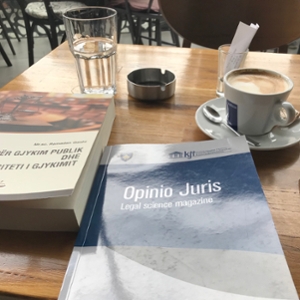
In addition to my in-depth discussion with Mr. Gashi about domestic violence, I also attended a daylong conference on Thursday centered around DV. The conference was not only about DV, but specifically about what they called "secondary victimization" of DV survivors by the very institutions that are in place to protect them. There were many representatives of government, law, and law enforcement that spoke on a number of panels throughout the day. There were a number of Ministers invited to speak, but not a one showed up (and a few cancelled ten minutes before); the moderator of the panel was quick to bring our attention to this fact. She noted in front of the entire conference that Ministers rarely showed up to DV meetings or conferences, instead preferring to send representatives of the office (if they do anything at all). I could not help but be reminded of the last-second cancellation of the Minister of Education last week for the Youth and Violence Conference I attended. I can absolutely understand how frustrating it is to be such a clearly last priority for the people appointed to represent and care for you in your own government. The conference was centered around a report by the Ombudsperson's office (from what I understand, this is an independent and advisory arm of the government that investigates misadministration or complaints of right's violation). The Ombudsperson himself was on the panel (and stayed for the entire conference); he called attention to the main problem areas of the implementation of DV law; incredibly long processing times for protection orders (and cases in general), as well as corruption within the police forces themselves. I got to meet the Ombudsperson during our lunch break, and was greatly impressed with his care for and knowledge of the gaps in implementation of DV laws in Kosovo. Unfortunately, his office serves an advisory role; the Ministers can and should (but do not have to) take his recommendations as requirements. Overall, the conference was extremely educational; despite some friction between the police inspectorate representatives and some politicians (which resulted in boo-ing and microphones being cut) it is evident that the citizens and civil society are pushing as hard as they can to make change for survivors of DV, and to hold the government accountable for its mistreatment.
One of the panels at the conference:
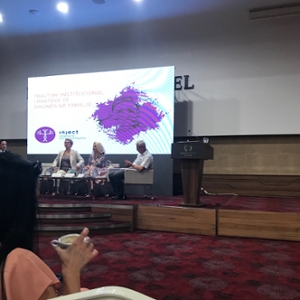
This week I also attended a meeting with members of the Peace Corps about a youth leadership project they are running in the nearby town of Podujevo. Kosovo is a very young country (the median age is around 24), and youth-focused programming has been on the rise. This particular program is a summer program, meeting once per week to work on leadership, resume building, and professional skills. We heard from three graduates of the program, who expressed their extreme gratitude at the opportunity they had been given. They noted that public schools in Kosovo do not have any curriculum based on professional development and leadership, and they consider this gap a large factor in Kosovo's youth unemployment rate. From what I learned last week at the youth violence conference (there is no curriculum in schools on domestic violence for youth, nor are there psychologists in every school) Kosovars find that the Ministry of Education is missing a large opportunity to shape the future of Kosovo (and frankly, letting the youth down in a number of areas).
On a lighter note, I was able to head out for some fun this weekend! I took the bus to Germia Park on the outskirts of Pristina, which is a huge green space with trails and a giant swimming pool. I unfortunately didn't bring a bathing suit, but will definitely be back next weekend! Instead, I went on a two mile hike through the Kosovar wilderness, which was gorgeous and shady. And as a special treat, I stopped by my favorite (new) lunch spot on the way home! I also booked myself a trip to the Albania coastline in July, I've rented a car (thanks Mom for teaching me how to drive a manual) and will be making the three hour drive on a Friday after work. I can't wait to keep exploring this amazing piece of the world, and I'm very much looking forward to my week next week!
Germia's GIANT pool:
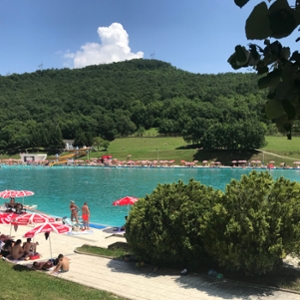
One of the many paved biking paths in Germia:
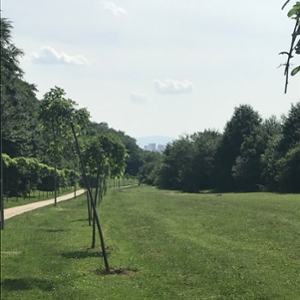
One of the best views from my (accidentally vertical) hike:
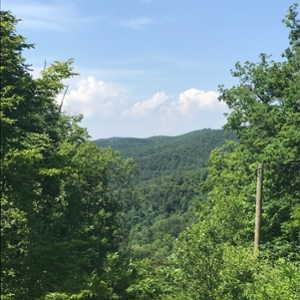
My reward lunch:
